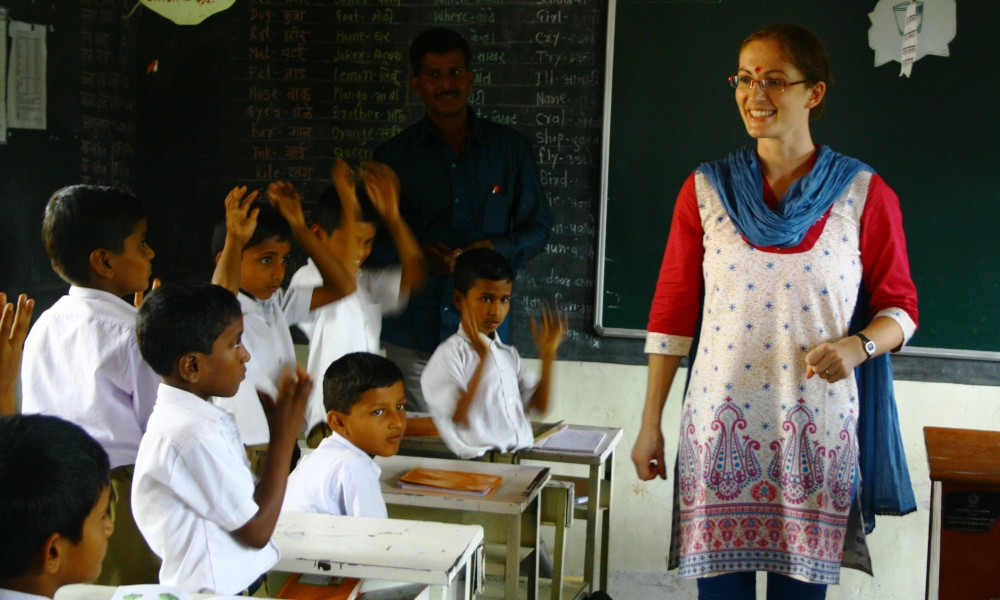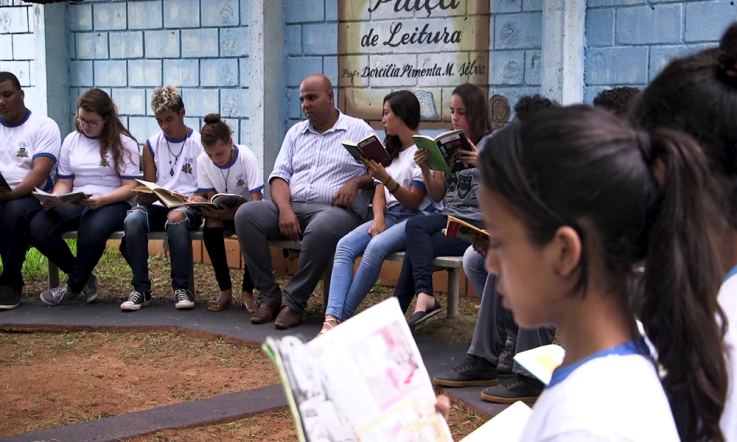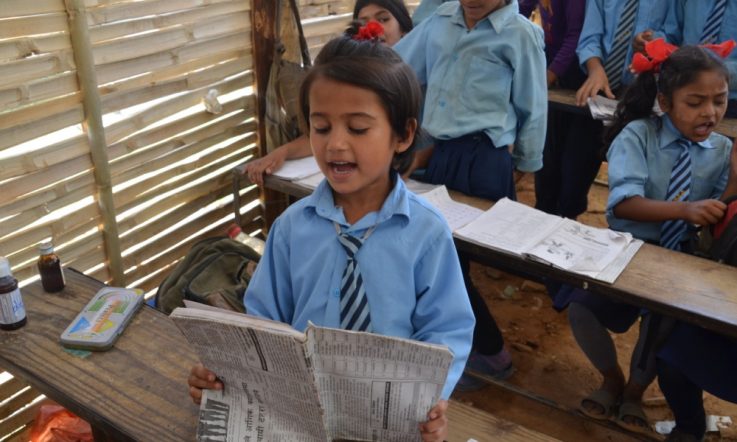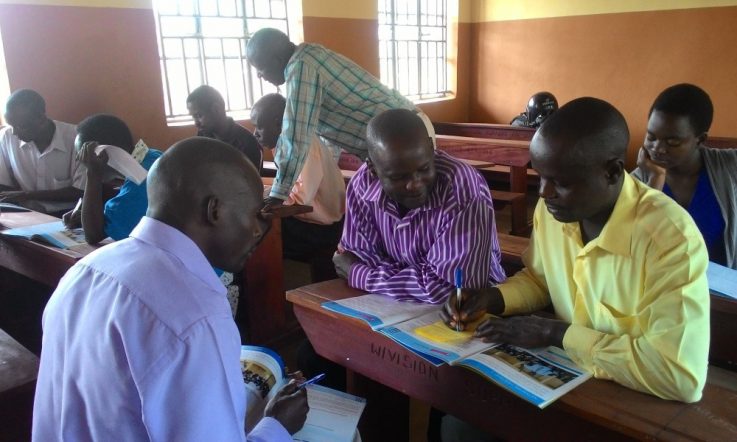Founded by Jennifer Star in 2008, Tara.Ed is an Australian non-governmental organisation (NGO) that aims to promote sustainable, quality education in rural and remote parts of India, Bangladesh and Afghanistan through teacher training and capacity building.
In today's article we speak to Star about how the organisation empowers educators to improve their own practice, and an exchange program involving Australian pre-service teachers.
Could you start off by giving readers a brief overview of what Tara.Ed is and the aims of the organisation?
Tara.Ed is an Australian NGO that aims to promote sustainable, quality education in rural and remote parts of India, Bangladesh and Afghanistan through teacher training and capacity building, infrastructure development and resource mobalisation. In Hindi tara means ‘star'. The organisation was originally conceived to ‘Build star teachers to help students shine'. Tara.Ed targets teachers rather than students in order to provide quality education. Since 2008, we've worked with hundreds of teachers and provided quality education to over 17 500 children.
You've said Tara.Ed's main focus isn't on things like building schools or providing books and uniforms, but rather on education. Could you tell me more about this focus?
If you think of all the education NGOs and charities you know, how many focus on ‘building'? I can think of many, just off the top of my head. But, what happens once the school is built and the funding dries up? Who maintains the school building? Who pays the teachers? Many of Tara.Ed's partner schools are those that have been built by well-meaning NGOs. We work with these schools over a six year period to develop capacity in the teachers, maintain and develop infrastructure and implement a sustainability plan, essentially building capacity in our schools to continue on their own, once we have moved on.
Funding cycles are typically between six to 12 months, but Tara.Ed works with schools over a six-year period. Why did you decide to do this? What kind of work do you do over those six years?
Research clearly shows that a key factor in quality education is the teacher – they are the single, greatest in-school influence on student learning and achievement. The main thrust of Tara.Ed's work is geared towards training, empowering and supporting teachers to be agents of change. While grounded in similar principles, our teacher capacity building program is unique to each school. We normally start by exploring teacher identity and the role of the teacher, before moving into quality teaching strategies such as reflective teaching, action research and collaboration through professional learning communities.
Essentially, the aim is to empower teachers with the tools to apply their own, contextual knowledge and experience and develop and improve their own practice. We work with each school for a six year cycle because we want the change to be sustainable – rather than just asking for a behaviour change, we are asking our teachers to change their mindset. Such change does not happen overnight!
Alongside the teacher capacity building program, we support teachers through the development of classrooms and infrastructure that is conducive to learning (from the little things, like desks and chairs all the way to libraries and computer labs) and mobilise teaching resources to ensure a whole-school approach to quality education.
What are some examples of the things you do to build teacher capacity and empower the educators that you work with?
We already know what good teacher training and professional learning looks like; it is teacher-driven, collaborative and grounded in practice. Most teachers in the developing world, especially those in rural areas in which Tara.Ed works, have limited access to continued professional learning. If they do go it, is usually top-down lectures or workshops which have little relevance to the realities of their classroom. In contrast, Tara.Ed's programs are developed in consultation with the teachers and school leaders, and are focused on collaboration and sharing of practice.
One of our most successful programs is the Tara.Ed Teacher Tour in which Australian pre-service and beginning teachers have the opportunity to spend a month on exchange in a Tara.Ed partner school. During the time they are in India or Bangladesh, they work with one teacher and one class, and are required to undertake an action research project in collaboration with their Indian teacher. As well as being a vehicle for the exchange of ideas and introduction and implementation of different teaching perspectives and strategies, the Tara.Ed Teacher Tour establishes a network of teachers from both Australia and India who continue to collaborate, share and support each other beyond the life of the physical program.
Collaboration is one of Tara.Ed's core values. In what ways do you support educators to work cooperatively with a common purpose? Do you involve the community in all the work you do?
At the start of every Tara.Ed program, I always ask the teachers involved to tell me how many years they have been in the classroom. At my last school, the combined total teaching experience of the teachers in the room was 468 years! Tara.Ed's programs are not a one-way transmission of knowledge. The exercise I describe above shows that the teachers already know how to teach – in one school alone, there was already over 400 years of teaching knowledge. This is why Tara.Ed is focused on collaboration – not only is it a key element of quality teaching, it drastically increases the amount of teaching experience and knowledge available to the individual teacher to improve their practice. Our job is to empower teachers with the tools they need to speak out, reflect on their practice, share practice and, ultimately collaborate with their colleagues.
Because each school and classroom context is so unique, we have to include the knowledge of the teachers and wider community within our program design – otherwise we would simply be reinventing the wheel.
Could you tell me more about your work in Bangladesh and the impact you're having on the local communities there?
The context in Bangladesh is very different to the context in India, and so, while we still focus on the teacher, and have many similar programs (such as the Tara.Ed Teacher Tour and teacher capacity building) our projects have to be different to address the needs of the community. In Bangladesh, access to education is still an issue for girls and minority groups and one of our most successful program in Bangladesh, the annual Uniform Drive targets this need.
In the 2014-15 academic year, Tara.Ed provided funding to the value of AU$12 per child for a school uniform, notebook and pen to be provided to each school enrolment. The school students, teachers and wider community designed the uniform, choosing a burgundy and white salwar-kameez for female students and a burgundy shirt and black pants for male students. A total of 199 students were provided with school uniforms in the first year, of which 96 were boys and 103 girls.
The school uniform has resulted in the development of school pride, as students of the school are easily identified within the wider community. As a direct result of Tara.Ed's Uniform Drive, student enrolment in Class 6 for the 2015 Academic year increased by 65 per cent from previous years. This trend has continued each year, with greater numbers of students gaining access to, and completing a full course of compulsory education.
What about Afghanistan? Could you share more about the teacher mentoring program that has been established?
Tara.Ed's work in Afghanistan is predominately with teachers who are returned refugees trying to re-establish their lives and communities post conflict. Obviously projects such as the Tara.Ed Teacher Tour are not a viable option in these circumstances, so drawing on our understanding of collaboration and quality teaching, we developed an online mentoring program in which Australian teachers were connected with Afghan teachers through open source platforms.
In a similar manner to the teacher tour, each pair had to collaborate on an action research project over a period of six months, before presenting it to the wider group. This project is still undergoing evaluation, but the feedback we have received from the teachers indicates online collaboration may be just as effective as the face-to-face programs Tara.Ed has run elsewhere.
Is there any way that readers (Australian or otherwise) could get involved in your programs?
We are always on the lookout for teachers and education professionals to contribute to Tara.Ed – either by travelling to India or Bangladesh to lead a teacher tour, volunteering to be an online mentor for teachers in Afghanistan, or simply making a donation to our Bangladesh Uniform drive.
Jennifer Star is founder and President of Tara.Ed., and Manager, Professional Learning (India) at the Australian Council for Educational Research (ACER). In 2017, Star was a winner at the Australian Women's Agenda Leadership Awards in the category ‘Emerging Leader in the Not for Profit Sector' in recognition of her work at Tara.Ed.
Visit taraed.org/ to learn more about the organisation and to get involved in its programs.



